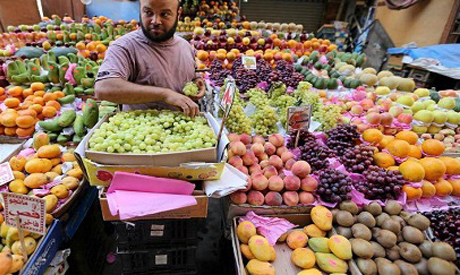
The decline in vegetable prices helped in reducing inflation (photo:Reuters)
Egypt’s headline inflation went down to 4.3 per cent in January from 5.4 per cent in December, according to the Central Agency for Public Mobilisation and Statistics (CAPMAS), reports Ahmed Kotb.
The CAPMAS report cited a 1.6 per cent decline in food prices on a monthly basis in January and a 0.5 per cent decline on an annual basis compared to January 2020. The decline was driven mainly by the decrease in the prices of some commodities, including vegetables, which fell by 20.4 per cent compared to December.
Egypt’s Consumer Price Index, according to the report, recorded a monthly rate of negative 0.4 per cent in January, compared to 0.7 per cent for the same month last year, and negative 0.4 per cent in December 2020, the statement added.
The figures come after an average inflation rate of five per cent was reported in 2020, the lowest in 15 years, according to the report. CAPMAS said this was the largest annual decline in inflation among emerging markets worldwide, with the figure falling by 4.2 percentage points from 9.2 per cent in 2019.
Inflation remains within the Central Bank of Egypt’s (CBE) target range of seven per cent, plus or minus two percentage points, despite the precautionary measures aiming to curb the spread of the coronavirus that were expected to raise the inflation rate.
The CBE adjusted its target range for inflation at the end of 2020 from nine per cent, plus or minus three percentage points, to seven per cent (+/- two per cent).
Initiatives to ease the effects of the coronavirus pandemic on the Egyptian economy helped bring down the inflation rate, despite expectations by global institutions like Fitch Ratings and Bloomberg of a 5.9 per cent reading.
These efforts included government controls on food prices by increasing food stocks and making them available at various selling points.
“Inflation for January 2021 came in at lower than our expectations on the back of declining vegetable prices,” said Radwa Al-Sweify, head of research at Pharos Holding, adding that a higher reading was expected over the first nine months of this year, slowing down only in the last quarter of 2021.
Slowing inflation figures will lead to a decrease in the expected average for 2021 to 5.3 per cent, she said.
She expected that February would see a monthly general increase in the inflation rate of 0.5 per cent and a general annual rate of 5.2 per cent across Egypt, with 4.8 per cent in cities.
Al-Sweify added that since the index reading was lower than expected, this would increase the possibility of a 50 basis points interest rate cut early this year.
However, the recent acceleration in global commodity prices, especially oil, may prompt a revision of a cut to Egypt’s interest rates, forecast for March. Brent crude oil prices climbed to more than $60 per barrel this week, up from about $40 in November 2020, and less than the $20 when the pandemic crippled the global economy last April.
The CBE’s Monetary Policy Committee is due to hold its next meeting on 18 March, and inflation data are likely be followed up until that time.
The committee kept interest rates unchanged at its last meeting on 4 February, after the continued slowdown in economic activity with the spread of the second wave of the pandemic globally.
This was the second consecutive decision to keep rates unchanged following two successive cuts of 50 basis points during the months of November and December and after a historic cut of 300 basis points in March 2020 at the beginning of the pandemic, leading to a total rate cut of four per cent in 2020.
*A version of this article appears in print in the 18 February, 2021 edition of Al-Ahram Weekly
Short link: